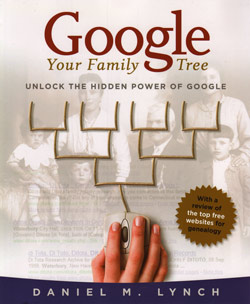I finally got the opportunity this week to sit down and find out what everyone was raving about as deals with Dan Lynch’s new book, Google Your Family Tree. Shucks, I’ve been using Google since the “beginning,” and figured I knew all about it. Clearly, that wasn’t the case at all.

I bought several cases of the books to sell in the FRPC bookstore during the Salt Lake Christmas Tour – books I bought because my attendees were demanding them. After selling 45 books within the first few hours, I had to see what this was all about. One of the genealogists in attendance pointed out that in the first five minutes with the book, he had learned three things about Google that he hadn’t known before – things that would help him in his genealogy research. So I set out to learn more myself.
As we all know, Google is by far the most popular Internet search engine available to us today. The Internet is also loaded with genealogical and historical databases, web pages, indexes, photographs, video and stuff we never even thought of before. Finding and accessing these resources is our challenge – and it looks to me like if you know how to harness the overwhelming power of Google, you may – just may – be able to break some of those genealogical brick walls you have before you. If nothing else, you’ll certainly be able to locate data that will fill in holes and add richness to your family story.
First off – and maybe more important than anything else, Dan explains though words, illustrations, and pictures just how to search “smart.” Sure – you can just type in that string of words that you think may be on the Web somewhere, but then again, you might want to type words that will bring you the results you actually want. The first three chapters of the book, as well as Appendix E (see below) really get down into the nitty-gritty of searching.
Chapters 3 through 14 deal with Google applications that enhance the family history research experience. Apps like Language Tools, Google Books, Google News Archive, Blog Search, Images & Video, Google Alerts, Google Maps, Google Earth, Google Notebook, and the Google Toolbar all have direct application to our genealogy search.
Google is truly helping genealogists open up the resources of the Internet – and Dan’s cool book makes using Google easier and more produce than ever before. Every genealogist with a computer can profit from the volume.
The following is directly from the Table of Contents:
Foreword
Acknowledgements
Introduction
Chapter 1 – Search Engine Basics
The Foundation of all Google searches, this chapter describes basic functionality, screen layout, use of keywords, basic commands, and syntax
Chapter 2 – Interpreting Web Search Results
The anatomy of Google Web Search results and the powerful commands that can be accessed from links appearing within your search results
Chapter – 3 – Advanced Search Techniques
A detailed description of advanced search techniques, both command-line entries as well as those used in the Advanced Search Form
Chapter 4 – Language Tools
Using the foreign language capabilities of Google, including automatic language translation, International content search, and Google’s offering worldwide
Chapter 5 – Google Books
Tapping the content archives found within Google’s growing online digital library and tips for using these books in your family history search
Chapter 6 – Google News Archive
Stepping beyond the current-day news into the rich historical news archive, learn to use the time line feature to quickly sort through historical results
Chapter 7 – Blog Search
An in-depth look at searching through and using blog postings as an effective means to conduct your family history research
Chapter 8 – Images & Video
Bring you research to life with pictures and video by learning special tips for getting the most value from Google’s image and video archives
Chapter 9 – Google Alerts
Search while you sleep! Discussion and step-by-step instructions for using Alerts to make Google work as hard as you do in finding your ancestors
Chapter 10 – Google Maps
A look at the indispensable tool for researching places and unique integration with Google Local and Street View
Chapter 11 – Google Earth
An in-depth look at one of the most addictive of all Google applications, you’ll be able to “travel” to the home of your ancestors and anywhere else you desire
Chapter 12 – Google Notebook
Google Notebook enables you to keep your research organized and available – even when performed on different computers – and easily shared with others
Chapter 13 – The Google Toolbar
An optional add-on requiring download and installation, the Google Toolbar offers a host of one-click wonders; also includes brief mention of Google Chrome
Chapter 14 – Other Tips and Tricks
More than a dozen additional features of Google that are too good to ignore, even if they don’t have a direct connection to genealogy research
Appendix A – Getting Started in Genealogy
A condensed step-by-step guide for those just starting to trace their family tree
Appendix B – Top Sites for Genealogists
An overview of the leading free and fee-based websites for genealogy, including a top-ten favorites list and dozens of other useful resources from around the world
Appendix C – Other Internet Search Engines
A look at the useful features of more than a dozen other Web search engines
Appendix D – Web Search Engine Defined
The history and evolution of Internet Search Engines, courtesy of Wikipedia
Appendix E – Syntax Summary & Quick Reference
A concise listing of Google commands and syntax with examples of their use for genealogy
Index